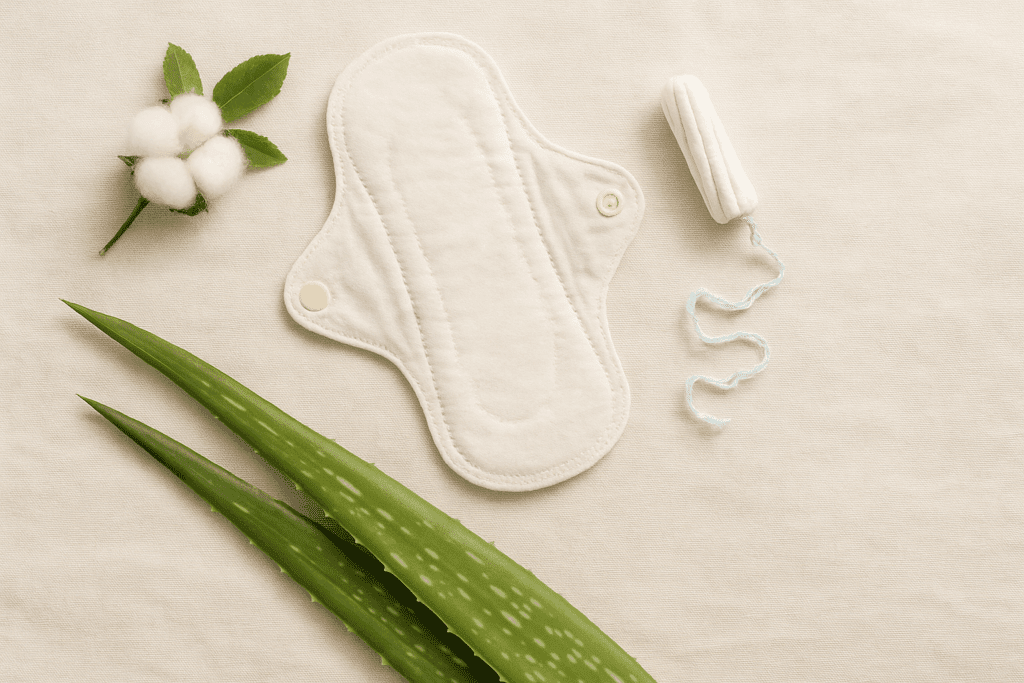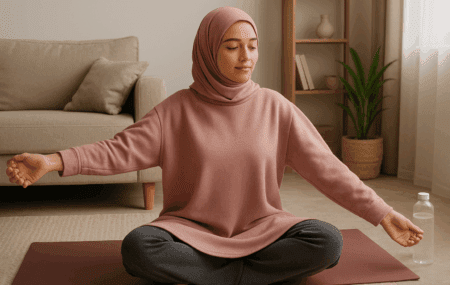
Organic Period Pads: A Healthier Choice for You and the Planet
Have you ever stopped to think about what’s really in the period pad you use every month? Periods are natural, but the products we rely on can affect our skin, comfort, and the environment far more than we realise. We’re not the only ones thinking about this! Many women are moving toward organic period pads because they’re gentler on the vulva, free from unnecessary additives, and often made with lower-impact materials. For those of us who prefer pads, organic period pads can be a simple, meaningful switch.
And this shift isn’t just a passing trend. It’s a conscious decision to care for your body and the earth. Here’s what that means, and why it’s worth considering.
What are organic period pads?
Organic pads are typically made with certified organic cotton (or, in some cases, bamboo-derived fibres). They are designed free from harmful chemicals such as dioxins, chlorine, and pesticides, which are commonly found in conventional pads. Many people avoid unnecessary synthetics that come into contact with the skin and use plant-based or reduced-plastic layers where possible. The aim is simple: fewer irritants, better breathability, and clearer ingredients.
Look for these labels to identify them:
- GOTS-certified organic cotton (Global Organic Textile Standard)
- OEKO-TEX® Standard 100 (tested for harmful substances)
- FSC® or PEFC (responsibly sourced pulp, if used)
- Clear ingredient lists on the box (topsheet, core, backsheet, adhesive)
But what truly sets them apart from conventional pads, and why switch? Let’s break it down.
1. Better for your body
The vulvar area has thin, sensitive skin that can react to fragrance, certain dyes, and some adhesives. Conventional pads sometimes include these extras, like dioxins (by-products of bleaching found in conventional menstrual products). This may trigger itching, stinging, rashes, or contact dermatitis, especially if you have sensitive skin, eczema, vulvodynia, or pelvic pain.
Organic pads prioritise unscented, dye-free topsheets (usually organic cotton) and chlorine-free processing, reducing common irritants. That doesn’t mean all conventional pads are unsafe; it means cleaner, simpler materials can be kinder to delicate skin.
Did you know? The vaginal area is highly absorbent, making it easier for toxins to enter the bloodstream. Organic pads help shield this delicate area from exposure to harmful chemicals.
2. Breathable and comfortable
The middle layer of a traditional pad – the absorbent core – is made from rayon. Rayon is a bleached wood pulp fibre that can dry out the mucus of your vulva and releases dioxin, a known human carcinogen. Regular pads also use adhesive glue and “fresh” scent that have no place being near the vulva!
Unlike synthetic pads, however, organic options have natural fibres that allow for better airflow, and prevents bacterial overgrowth. This reduces the risk of yeast infections and skin irritations caused by trapped heat and moisture, keeping you fresher for longer.
Many women also find the texture gentler and less “plasticky,” which can make a noticeable difference in comfort.
3. Eco-friendly and sustainable
Traditional pads are packed with chemicals and contribute heavily to environmental waste. Most contain up to 90% plastic, taking around 800 years to decompose in landfills. With the average woman expected to use approx. thousands of pads in her lifetime, that’s a huge environmental footprint!
Organic pads focus on lower-impact fibres (like organic cotton grown without synthetic pesticides) and, in some cases, plant-based films or recyclable/compostable packaging. This can reduce chemical use on farms and lower plastic use overall.
Remember: “Organic” refers to the fibre, not the entire pad. Many products still need a leakproof backing, which may contain plastic. Always check brand details; never flush pads—dispose of them in general waste unless the brand clearly offers a safe composting route.
4. A lower carbon footprint
Conventional menstrual products are produced via energy-intensive processes. They are predominately made in factories powered by fossil fuels, contributing to greenhouse gas emissions.
Organic-focused brands often aim to reduce emissions through better materials, leaner packaging, and more transparent supply chains. Some use renewable energy or carbon-aware logistics; others offer biobased wrappers to cut plastic. Footprints vary by brand, but choosing fewer synthetics and clearer sourcing generally moves impact in the right direction.
5. Absorbent and reliable
A common myth is that organic pads aren’t as absorbent. In reality, absorbency depends on design (the core, channels, length, and fit), not just whether the top layer is organic. Many organic ranges offer liners, day, night, and heavy-flow options comparable to conventional pads. Some also include bamboo-derived fibres for added absorbency and softness.
Fit first: pick the absorbency and length that match your flow and body. If you’re leaking, try a longer or higher-absorbency option, or switch brands for a better fit.
6. Cost-effective in the long-run
While organic pads may appear more expensive upfront, they can actually be more cost-effective in the long run. Their high absorbency means fewer pads are needed per cycle, which can save you money over time. Plus, by investing in products that support your health and the environment, you could potentially avoid future medical costs associated with skin sensitivities or hormonal imbalances.
7. Aligning with ethical values
Many organic pad companies emphasise fair labour, transparent sourcing, vegan/cruelty-free standards, and give-back programmes addressing period poverty. For Muslim women mindful of amānah (trust), iḥsān (excellence), and avoiding isrāf (waste), choosing products that are clear about their ingredients and ethics can feel aligned with faith and values.
8. A positive change for future generations
When you choose organic, you’re not just taking care of your health — you’re also making a choice that benefits future generations. Choosing lower-impact materials, reducing unnecessary plastic, and supporting responsible brands helps protect soil, water, and ecosystems. It’s a small, steady contribution to the world our daughters will inherit.
How to switch (practical steps)
- Start with a trial box in your usual absorbency to test fit, comfort, and leak protection.
- Read the label: Prefer unscented, dye-free, chlorine-free, and GOTS-certified organic cotton topsheets.
- Match to your flow: Keep both day and night pads; add super/night-plus for heavy days or postpartum.
- Rotate brands if needed: Design varies. If one bunches or feels stiff, try another.
- Prevent chafing: Choose a smooth topsheet, change pads before they feel wet, and consider a thin layer of barrier ointment (fragrance-free) on the inner thighs if you’re prone to rubbing.
- Travel kit: Stock a small pouch with spares, wipes (unscented), and a disposal bag.
- Heavy bleeding? If you soak through a pad hourly, pass large clots, or bleed >7 days, speak to your GP—evaluation and iron testing may be helpful.
- Budget tips: Buy multi-packs, consider subscriptions, or mix with reusable pads/period underwear on lighter days to reduce cost and waste.
Big picture: A Muslim woman’s take
If the above hasn’t already convinced you (we hope it has…), let’s zoom out. Islam views nature as a great blessing that nourishes humanity. The Qur’ān reminds us of how the environment sustains human life (Sūrat Nahl, 16:65; Sūrat Al An’ām, 6:99). Caring for it is, therefore, a amānah (trust) we must uphold as stewards of this Earth. Indeed, in Sūrat Ar-Raḥmān (55:1-8), Allah (ﷻ) describes the harmony of creation, including the sun, moon, and stars. Human beings are warned to not transgress the world’s perfect balance by exploiting or altering it for selfish purposes (Sūrat al Nisā’, 4:119). This includes causing harm to the earth via environmental degradation, such as pollution, deforestation, and exploitation of natural resources. We are taught to be responsible, ensuring the planet remains healthy for future generations.
Conservation is also deeply rooted in Islamic tradition. The Prophet Muḥammad (ﷺ) advised: “Do not waste water, even if performing ablution on the banks of a flowing river.” [Sunan Ibn Mājah, 425]. We know that resources are limited, so we should use them mindfully and efficiently, and not waste.
Finally, remember, every form of life has inherent value as part of Allah’s creation. Animals, plants, and ecosystems are all seen as signs of Allah (ﷻ). They glorify Him in their own ways, even the smallest of creatures [Ṣaḥīḥ al-Bukhārī, 536]. So by choosing products that are free from harmful chemicals, biodegradable, and sustainable, you’re making a conscious decision to prioritise health, comfort, and the environment all in one. So why not make the switch today? Your body and the Earth will thank you.
P.S. The same principles apply across menstrual care: you can look for organic, unscented, and lower-impact options in tampons, liners, reusable pads, or period underwear, and choose what works best for your body and your life.
Educational only and not medical advice. If you have persistent irritation, heavy bleeding, or recurrent infections, please consult a clinician you trust.

